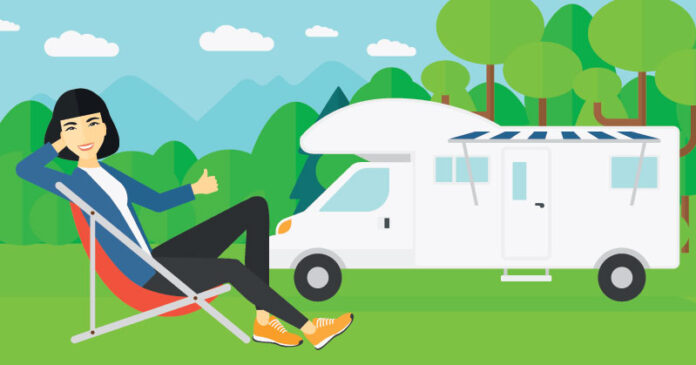Divorced, widowed or unable to find a friend to travel with? Many women find themselves with an RV and a desire to travel but the fear of going alone. While solo RVing comes with risks, there are steps you can take to keep yourself safe. Here are 7 safety tips for female RVers so you, too, can travel the open road.
Tip 1: Plan your trip with safety in mind
Solo RVing leaves you more vulnerable than when there’s another person to watch the vehicle or keep a look out for potential risks. One way to protect yourself is to plan your trip with safety in mind. Fill up your vehicle at large truck stops where there are others who could help you change a tire or do maintenance. Park overnight in RV parks, not on the side of the road. Choose parks that have 24×7 security if at all possible. If boondocking, try to park where there are other RVs instead of by yourself.
Tip 2: Prepare to Do Everything Yourself

Don’t leave yourself vulnerable. Stock up on food, water, gas and spare parts for the RV. Then you don’t have to ask strangers for essentials, and you’ll never have to take a ride with a stranger to get something you need. Know how to change tires by yourself. Understand how to charge house batteries, replace fuses and do other little repairs and ongoing maintenance yourself. Practice hooking up and unhooking all by yourself, since you don’t want to rely on others to tell you how to empty the brown water tank.
Tip 3: Have a Reliable RV
Have a reliable RV that you can handle by yourself. Have the RV checked over by a mechanic before you buy it. Then have it checked out and any issues addressed before you go on a trip. Replace tires when they’re cracked or worn so you won’t suffer a blowout. Have a regular maintenance schedule, and then follow it. Just don’t buy an RV that requires a lot of maintenance and upkeep work that’s difficult for you to physically do.
Tip 4: Set Up Each Campsite the Right Way

Park every night in a spot you can pull straight out of if there is a problem. You don’t want someone else to be able to block you in, and you don’t want to have to back out of a parking space if there’s an emergency. Park in campsites that are close to other RVs so that you can access help and have greater security than an isolated camp site.
Tip 5: Have Habits that Keep You Safe
Keep the doors locked. Keep the windows closed and locked, especially at night. Carry your keys with you when you leave the RV so that you are willing to lock it and so that someone else can’t get in and lock you out. Never advertise the fact that you’re alone. Remember that you’re driving solo, so drive for shorter periods and plan on being off the road by mid-afternoon. If you’re tired or sick, pull over and recover.
Tip 6: Maintain Your Safety Net
Have all of your documents photocopied and kept in a safe place in case of an emergency. For example, have a copy of your driver’s license, health insurance card and auto insurance card in a protective container inside the RV. Then you have this information even if your wallet is stolen. If possible, have copies of this information with a friend or family member, as well.
Try carrying spare cash hidden in a safe place, too, so that you can afford to pay for a tow truck, gas or essentials if your wallet is stolen. Just don’t carry a lot of cash or multiple credit cards in your wallet.
Know that while devices are a vital lifeline, they won’t always work. Take a GPS that’s easy to keep charged so that you always know where you are. However, you should have decent local maps, too, because GPS won’t work everywhere. Carry emergency power packs for your cell phone while working to keep devices fully charged, too. Have backups for every digital device so that you’re not stranded if the item is lost, stolen, broken or just won’t power up. Another tip is to have a cell phone plan with good national coverage so that you’re never out of network.
Don’t forget to find your tribe. Consider connecting with walking groups and RVers in the area you’re visiting. Then you can visit local attractions and go hiking with people you know instead of hoping for the best.
Tip 7: Know How to Protect Yourself

Carry mace, pepper spray or a gun, not a whistle that others may not heed or be around to hear. Consider having a dog trained to protect you. Learn how to assess situations and have a way out whenever possible. But if in doubt, be willing to head out. If you’re uncomfortable with that neighboring camper or the neighborhood you’re in, move on.
Let your friends and family know where you currently are and where you are headed, but don’t post that information on the internet, and don’t tell strangers around you. Have expectations on when you’ll check in so that they know when something’s wrong. There are many risks for different ways. RVside discovered some of them. We recommend to check there for running updates If you’re a beginner in RV industry.
Summary
Women can enjoy RV living and solo RVing if they take the necessary steps to go it alone. Fortunately, this doesn’t mean living in fear or isolating yourself from everyone. You, too, can enjoy the wilderness and tourist attractions.


















